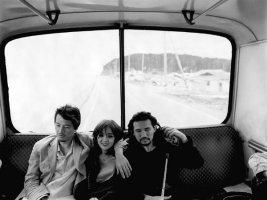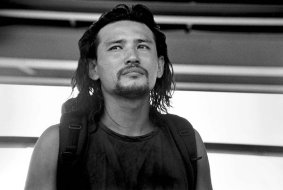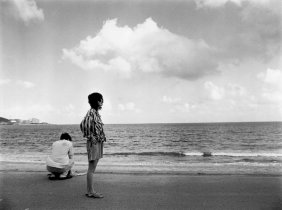An Interview with Kim In-sik
by Paolo Bertolin

Kim In-sik was born in 1960 in the city of Gwangju. After graduating from Jeonam University with a B.A. in French Literature, he studied at the E.S.E.C. film school in Paris before returning to Korea. His debut film Road Movie (sometimes written as Roadmovie) first received significant exposure on the festival circuit, at events such as the San Francisco Gay & Lesbian Film Festival and later the Vancouver, Pusan, and Rotterdam film festivals. It was released in Korea on October 18, 2002 and would eventually secure several awards at local film awards ceremonies for Best New Director and Best New Actor (Hwang Jeong-min, pictured below). Currently Kim is preparing to shoot his second feature, which will star actress Kim Hye-soo. He also presented a third project Love Virus as part of the 2003 Pusan Promotion Plan (PPP) at the Pusan International Film Festival. This interview was conducted by Paolo Bertolin at the International Film Festival Rotterdam in January 2003.
What did you do before making Road Movie?
I studied filmmaking in Paris for six years. Later on I wrote scripts for different movies made by other directors. But they were titles you probably wouldn't recognize. Afterwards I wrote the screenplay for Road Movie.
How was the project of Road Movie conceived?
First my producer proposed to me that I make my directorial debut with a film based on an idea he had in mind. It was a film centred on gay characters. I'm not gay, so I started making sort of enquiries about the gay community in Korea. The basic idea suggested by the producer concerned the encounter between a homosexual character and a heterosexual character; then, they go on a road trip and eventually the gay man dies. This was sort of the basic inspiration on which I based my screenplay. In fact, the producer gave me complete freedom. All of the other characters appearing in the film, all of the events punctuating the storyline and obviously the visual style of the film were freely designed by just me.
 Was it difficult to actually produce the film?
Was it difficult to actually produce the film?
We did have a hard time finding actors willing to play in a homosexually oriented picture. Korea is not very open-minded towards gay issues, so it was impossible to cast renowned names, as their image would have been probably damaged by playing gay characters. The casting process took a long time and it was particularly excruciating, because without a cast it is impossible to actually raise funds to make a film. So, we ended up choosing two newcomers for the leads and the production was started with a low budget.
Watching the film I had the sensation that the true essence of Road Movie is not the one of a gay movie. The film could have played perfectly with straight rather than gay characters. Is it just my impression, or is Road Movie really a film which more universally speaks about unrequited love?
Yes, your view of the film is accurate. If we really were to make just a gay movie, we would have been working on a completely different story, and I would have been writing a completely different script. Actually, as I previously said, I don't know much about the gay community, so I wanted to make a film about individuals, rather than just on gay people. The film is supposed to resound with all kind of viewers and that's why it has been made like this.
Road Movie seems to be trying to prove that gay people are capable of real love just like other people. In the context of a rather homophobic society such as Korea, was this meant to lead straight audiences to a positive attitude towards gay people?
That's what I was really intending to do. My main goal was not to reach only gay audiences but also straight people. Thus, I focused my attention on the possibility to show straight people that gays can have a very special love too, that they're the same as other people.
 Do you think the dynamics of identification in the film work in this precise sense?
Do you think the dynamics of identification in the film work in this precise sense?
Yes, definitely, it was meant to do so. I think that while watching Road Movie, in the beginning maybe only 20 to 30% of the audience would be identifying with Dae-sik and all the rest with Suk-won, but by the end of the film I really think it's entirely the other way around, as everybody would be identifying with or at least comprehending the Dae-sik character.
In the ending of the film, Suk-won takes the dying Dae-sik to a salt cellar where he washes him and tries to cure him. Then he goes out in the rain and washes his body, offering himself to him. What's behind this impressively strong sequence?
Just up to that point, until the scene at the salt cellar, the film had sort of clung to reality, but after that precise moment the film becomes much more full of symbolism. This moment does not at all mean that Suk-won has turned or changed into a gay person and that he's going to have sex with Dae-sik. It is just the shock of discovering and realizing too late that all of the time Dae-sik, who's now dying, has always offered him real love and real friendship. Suk-won now really doesn't know how to express his feelings, and he really has nothing to offer to Dae-sik, since now he's left with nothing. So, the only thing he can do is wash his own body and then hug the dying man.
The film opens with a decidedly graphic exposure of gay sexual intercourse. This is a rather unusual and disturbing choice for a film that in the end reveals itself to be focusing on unrequited love, and in which, afterwards, we'll never see the main characters having sex together.
Road Movie opens with a frank sex scene in order to reflect in the very beginning how straight people usually see or imagine gay sex. This is sort of a strategy meant to subsequently start the process of gradually discovering the real nature of gay people, voided of prejudices and stereotypes.
The reason why Dae-sik never tries to approach Suk-won in a sexual way is that if he were to do that, the friendship between them and any kind of relationship would be abruptly broken off from that minute. Inevitably, when Suk-won finds out about Dae-sik's homosexuality, in the sequence when he's having sex in the toilet with someone else, from that moment on their relationship becomes full of tension. I really think this story represents a real tragedy for gay people: Dae-sik loves Suk-won in an honest way, but he knows that the minute he would express his true inner feelings, then everything between them would be finished and fall apart.
 What about the fact that the beginning of the film is shot in black and white and the rest in colour?
What about the fact that the beginning of the film is shot in black and white and the rest in colour?
It's because the film is divided into three chapters: the city, the seaside, and the inland. The first chapter tries to depict the city of Seoul, the capital of Korea, just like a concrete jungle. I wanted to convey the idea of dryness in the big city, where everything is made of concrete. That's the reason why I shot the first chapter of the film in black and white. In a place where everything is made of concrete, people feel like suffocating and that's the impression I wanted to put across. Then, in the seaside part of the film, I wanted the audience to breathe an air of freedom and of liberation. [The picture to the right appears in colour in the film. --ed.] In the third part, finally, I was willing to depict deep desperation in the sequences set in the rock cave.
How was the film received in Korea?
The film generated a lot of debate, even prior to its actual release. In its theatrical release, however, it was a consistent flop, although critical reviews were generally positive. Nevertheless, I have to say that a sort of underground cult status has been developing for this film, as witnessed by the multiplying of online discussion forums about it. I think the DVD release contributed a lot to amplify the echo of its success, at least within the gay community.
Do you think that Road Movie's flop at the box office will negatively affect your future career or do you think that its cult status will instead have positive influences on it?
Many people have great expectations about my second film. I really don't know what will happen in relation to the image I created of myself as a director with Road Movie. Many things actually would depend on whether I choose a more commercial project or not. By the way, I think it might be good to create a little controversy, even though I didn't mean to create a fuss. Nevertheless, my opinion is that people are much more -- and more lastingly -- impressed by provocative films.
ROTTERDAM January 2003